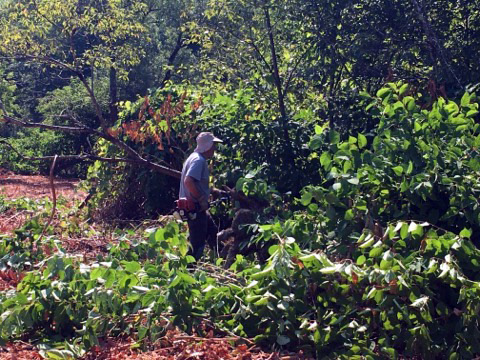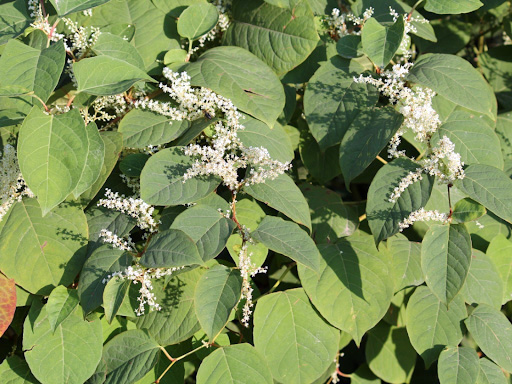
Taking on Knotweed at Trout Brook Preserve. (Photo courtesy Isobel Curtis)
Knotweed is a tenacious, voracious, invasive plant that threatens native plants throughout the Midcoast area. The Sheepscot Knotweed Project was established by a group of Midcoast Conservancy volunteers as a response to this pervasive problem, in hopes of helping people address the issue on their own land.
With the assistance of knotweed experts, landowners can learn how to control knotweed on their property. Those interested in learning more are invited to a free workshop in Alna, Saturday, Aug. 6, from 10 a.m. to 12 p.m. The workshop leaders will go over knotweed biology and management methods for knotweed patches of any size, in any location.
The workshop will take place in a demonstration knotweed patch so attendees have the opportunity to see different methods at work. It is critical to help protect water quality in the Sheepscot River and native biodiversity everywhere by fighting knotweed.

Knotweed (Photo courtesy Midcoast Conservancy)
The workshop is unstructured, with multiple knotweed experts on site. Attendees can drop by anytime between 10 a.m. and noon to talk and learn from one of them about knotweed patches and tour the demonstration site. There will also be a sign-up sheet for anyone who would like to receive or offer help fighting knotweed in their neighborhood.
The demonstration knotweed patch is across the street from Trout Brook Preserve. Sign up at midcoastconservancy.org/events. Anyone with questions can contact the Sheepscot Knotweed Project at sheepscotknotweedproject@gmail.com.
Midcoast Conservancy is a vibrant regional land trust that works to protect vital lands and waters on a scale that matters and to inspire wonder and action on behalf of all species and the Earth. The organization works throughout the Sheepscot River, Medomak River, and Damariscotta Lake watersheds.
Midcoast Conservancy manages over 13,000 acres in 55 preserves and 95 miles of trails, including Hidden Valley, a preserve with cabin and outdoor recreation equipment rentals and a low-impact forestry program. Community members can get involved in the organization’s work as volunteers with water quality monitoring, habitat restoration, fish passage projects, forestry and oyster farming or outdoor recreation and education. For more information, go to midcoastconservancy.org or call 389-5150.



